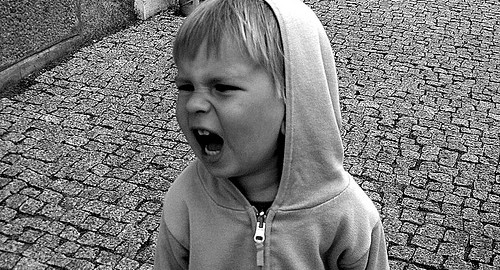Feeling Your Emotions
Copyright by mdanys
Every now and then it just feels good to sit down and have a real hard cry, doesn’t it? Or maybe, if you are a guy reading this, perhaps for you it feels really good to just blow off some steam and release it by hitting a punching bag or screaming really loud?
Can you relate?
When you have a really bad day at work, do you keep it to yourself or do you share it with people? It’s certainly not politically correct to go around the office complaining about your boss (nor would I recommend it), but do you vent your feelings to a confidant? And when you do vent, do you feel it is a productive process, or do your complaints just yield the usually consolation of “Things will get better tomorrow. Smile, you’ll be okay.”? When you get the latter, it is often very frustrating, isn’t it?
Over the years, I have noticed a trend where we as a society are shunning emotional responses more and more. We seem to want to make everything better and send only the best wishes for a perfect world, when we live in anything but a perfect world. Nothing makes me more insane than saying everything will be fine when it clearly is not.
Don’t confuse my message, I don’t support having an emotional tantrum. I am talking about having a natural release of emotions at an appropriate time.
Our emotions have many purposes and one of the most important is to motivate us to effect change! But change will only come if we allow ourselves to feel the emotion before us and express it (when appropriate, of course).
When friends come to us in confidence, its important to promote that its okay to feel what you are feeling, to let it out and express it. Expressing an emotion will allow us to own it, work through it and consider how we can change things. Shunning our emotions will only cause us to feel more misunderstood and frustrated.
So the next time you have a friend who is angry, think twice about offering optimism and positivity in the general sense it is usually offered, which typically doesn’t promote change. Instead ask the person, what made you feel this way? Is there anything you could have done differently? Is there anything you can do differently in the future? How can you use this experience to promote or effect change?
I think we’d do much better as a society looking at the source of our emotions and addressing how we feel rather than offering generic optimistic advice. And while optimistic advise has a time and a purpose, I think we are far over using it. I almost feel like we can’t handle people expressing emotions in a true and sincere and non-threatening way anymore. We just want them to go away and be happy.
Do you agree?




Oh, that’s a really hard question. I think it is important to hear what our friends tell us, good or bad. I think it is important for all of us to learn to put our feet in the shoes of those who trust us enough to come to us. I think that we should attempt to imagine their point of view and their reasons for having it. Do we help them problem solve and offer possible solutions? Do we simply lend a sympathetic ear? A shoulder to cry on? Offer nothing but comfort? Should we not reckon the situation as it is in reality yet offer no glimmer of hope? Sometimes the glimmer doesn’t appear until after a dream dies, and the glimmer is actually the twinkling of a new dream. I can understand how sugar coating reality is an exceptionally bad practice, but I will never leave any of my friends left sitting in the ashes with no encouragement. Sometimes all we can do is “muddle on through” certain things. Sometimes we need to self correct. Sometimes we need to course correct. Sometimes, we simply have to endure. Either way, friendships should provide an “assist” in times of need. (… and woe unto anyone who have had to disassociate from “friends” who were sociopaths or people with BPD who refuse to get treatment. I am sure there are other examples of people who need to be placed in the “non-friend” category.) Also, I am (sometimes “eventually”) happy that I have friends who speak to me soberly about things. I am lucky enough to have some friends to are attentive to the quality of the advice they give and are smart enough to know that an aptly spoken word is often far more effective than the “blurted truth.” Wait…did I answer the question? Nope. My answer is, “I am not sure.”
I don’t think any friend should ever leave their friends in the ashes with no encouragement. I think instead of blind encouragement we need to encourage direction through understanding our emotions.
I totally agree with you Eyes. Your statement is so heartfelt. I hate the sanitisation of our emotional lives. My best friend’s daughter is very angry at the moment because she didn’t get a part after an audition. I welcome her anger and think it is entirely understandable. She loved the part and would have been great in it. Her anger is, I think, part of her natural grieving process, for the loss of that role.
Yes, I agree with this completely. And I dont know whats in the research literature, but I wouldnt be surprised as to what but this trend isnt related to mental illness problems. Its as tho people think anything but *Happy* is abnormal and therefore mental illness and must be treated with drugs and therapy.
I absolutely agree. I've always said anger is a finger that points you in the direction of something that is not working for you, but if you ignore it/ shove it down, eventually that anger will turn inward. Feelings can be indicators, tools, if we listen to what they're telling us.